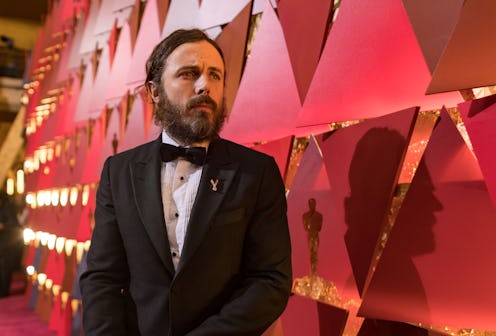
"Don't be dramatic." "It's not like he raped you." "This is part of being a woman." Many sexual harassment survivors are familiar with these phrases. We've heard them from others when we've told our stories, and we've said them to ourselves. And when I saw Casey Affleck win an Oscar on Sunday night, it felt like those messages were being repeated to me all over again.
Casey Affleck has been accused of alleged sexual harassment by two different women. I'm Still Here producer Amanda White sued him, claiming that he allegedly spoke in a sexually graphic manner to her, groped her, propositioned her for sex, told a camera operator to expose himself, and called women "cows." Cinematographer Magdalena Gorka alleged that Affleck also encouraged such behavior among the crew. Affleck settled the suits in 2010. Bustle has reached out to Affleck for comment on the allegations from White and Gorka, and has not heard back.
Affleck has denied the allegations in the past, however. In October of 2016, he told Vanity Fair about the charges, "People say whatever they want. Sometimes it doesn't matter how you respond. I guess people think if you're well-known, it's perfectly fine to say anything you want. I don't know why that is. But it shouldn't be, because everybody has families and lives." His Golden Globes acceptance speech also appeared to reference the allegations as he criticized "all the noise that sometimes surrounds people who live publicly."
My personal experience acts as a backdrop against which I see all of this play out. I was 13 the first time I was sexually harassed. I didn't think it was a big deal when a family friend told me I looked "more developed" than when he last saw me. I thought of it the same way I thought of, say, my brother teasing me. I didn't realize it was harassment.
After years of being catcalled and ogled at, I learned this behavior wasn't considered polite, but that it wasn't anything to get upset about either. When I got fed up and elbowed a guy who grabbed my ass in a club, I felt guilty for being so rude. When another guy groped me and called me a tease for not letting him into my apartment after a date, I told myself he was just drunk and went to his place after our next date against my better judgment. After he undressed me when I said "no," a friend I confided in said I was "overthinking it" and should be glad he didn't rape me.
What all of this adds up to is an idea that allegations of sexual harassment aren't serious — that they don't need to be treated with gravity, because "it could be so much worse."
But accusations of alleged harassment absolutely should be taken seriously. And right now, what it looks like from where I'm sitting is that these allegations aren't being taken seriously by the Academy. To the contrary, they've welcomed Affleck with open arms and a Best Actor award. In Affleck's words, he's been deemed "a part of this community."
Some might argue that the accusations are irrelevant to his performance in Manchester by the Sea. But I wonder whether that's just one more example of our culture turning a blind eye to sexual harassment and assault accusations. As a survivor of sexual harassment, I am not alone in my experiences; according to statistics from Stop Street Harassment and AWARE, the majority of women share similar stories. But the honors such men have been given reiterate to me and many others like me that while society may not wholeheartedly approve of what's happened to us, people don't consider it terrible, either.
Instead, many either doubt the victim entirely or view the incident, as I was taught to view my own harassment, as essentially harmless — the result of an otherwise good guy "messing up." Sticks and stones can break our bones, we're told, but words can't hurt us.
Except that words teach us to view ourselves as objects. Except that words are used to justify the violation of our autonomy. Except that words remind us that if we point this out, the people in power won't listen. Even if those words are as simple as "and the Oscar goes to Casey Affleck."